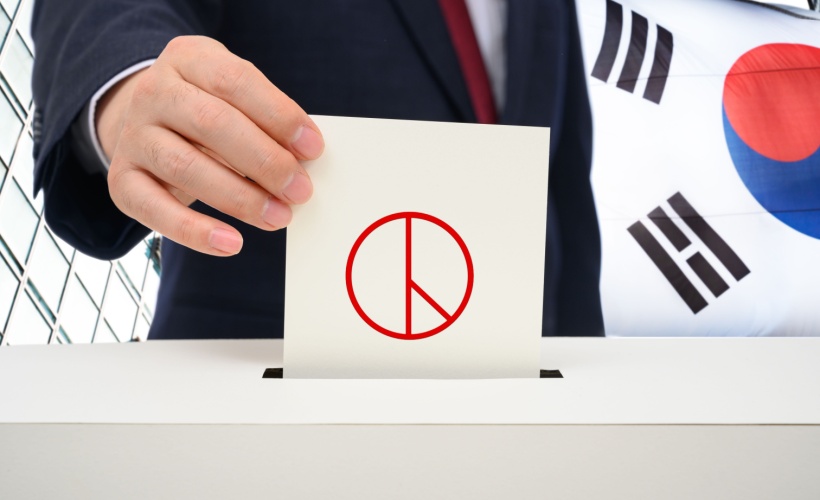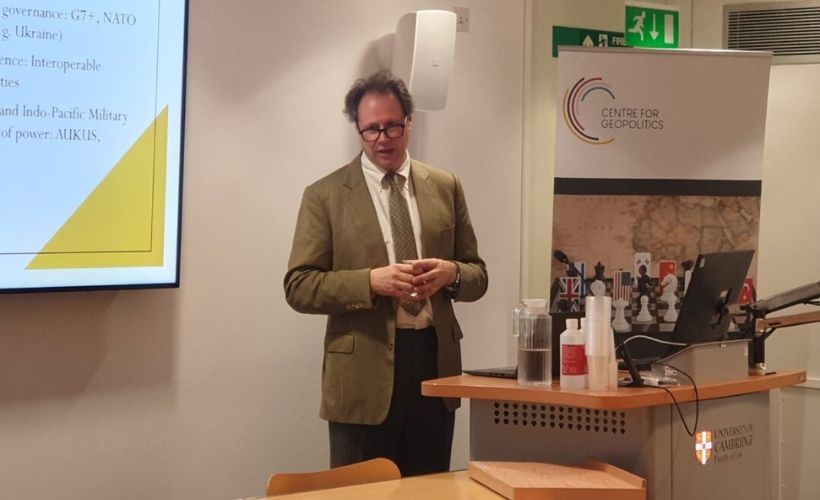By Chae Kyoun (CK) Ha, Research Assistant
As the first event to open the new year, the Centre for Geopolitics together with the University’s Faculty of Asian and Middle Eastern Studies invited an esteemed panel to discuss the peace and (in)stability of the Korean peninsula including Professors Choi Jong-kun, Timo Kivimäki, and Mr Glyn Ford who formerly served at the European Parliament. The event was chaired by Dr John Nilsson-Wright (Associate Professor in Modern Japanese Politics and International Relations and Head of the Japan and Koreas Programme, Centre for Geopolitics, University of Cambridge).
Early Successes of the Peace Initiatives
Professor Choi Jong-kun (Professor of International Relations, Yonsei University & Global Chair Professor, University of Bath), began by sharing his first-hand experiences of working inside the Korean government at a time when different initiatives were sought to bring peace and stability to the peninsula. He noted the challenges of working with a counterpart (North Korea) that does not have regular behavioural patterns.
He then laid out the key achievements of the Moon administration’s peace initiatives. These include turning around the hostile situation to a more positive inter-Korean relationship that led to the three historic inter-Korean summits – twice at Panmunjom and once in Pyongyang – as well as the three Trump-Kim summits in Singapore, Vietnam, and Panmunjom. The two Koreas also agreed on a comprehensive military agreement to reduce the tensions along the demilitarised zone (DMZ) to create a buffer zone. He also emphasised that since the beginning of the peace talks, North Korea had maintained the moratorium on its nuclear and missile tests which resumed after the regime change to a conservative Yoon Suk Yeol administration in South Korea. Professor Choi emphasized that these achievements were made just between May 2017 to December 2019, in less than two years of the Moon administration. At the same time, he noted that unlike the usual criticism of a progressive South Korean government, the Moon administration had in fact increased its defence budget by an annual average of 7% which is more than twice compared to NATO members or other OECD countries. It also improved South Korea’s missile capabilities while shortening the national conscription from 21 to 18 months.
Reflecting on the Shortfalls
While acknowledging the ultimate disappointment, Professor Choi stressed that the COVID-19 pandemic was an “existential threat” to North Korea and thus the peace process was seriously hampered by the North’s focus on its own internal vulnerabilities during the pandemic. He also noted the challenges following the Hanoi summit as the negotiations between North Korea and the US reached a stalemate. However, Professor Choi rejected the view that the peace initiatives under President Moon had resulted in failure. Had it not been for the Moon administration’s engagement with the North, the Trump administration’s maximum pressure approach from the early part of the Trump White House would have been maintained which would have prohibited any peace processes such as those witnessed at Panmunjom, in Singapore, Hanoi, and Pyongyang. He emphasised that South Korea had fully complied with the international sanctions against North Korea while peace initiatives were carried out, and there had been no casualties in the military during the Moon administration.
Peace as a Process
Professor Choi noted that he and President Moon had a shared understanding that peace is a process and there would be many difficulties and challenges on the way. Therefore, it was their goal to first convince North Korea that if they were to cooperate with South Korea first, it would lead to opportunities to negotiate with the United States to make things better for everyone. At the same time, South Korea had to convince the Trump administration that peace on the Korean peninsula not only benefits Koreans, but it’s a common good for the wider region and the international community and the global non-proliferation regime. Professor Choi stressed the importance of understanding this process-building and expressed his concerns over recent developments as the two Koreas enter the “Dark Age.” He noted that engaging North Korea through dialogue itself can be an asset as it provides more dataset on how to deal with the regime given how much of an outlier it is in international politics. Professor Choi further called for more innovative thinking on dealing with North Korea rather than old realist approaches.
Discussions
Professor Timo Kivimäki (Professor of International Relations, University of Bath) observed that the recently heightened tensions between the two Koreas would require more dialogues between the two in order to avoid possible accidents that might lead to larger conflicts. He questioned whether there are any additional areas for negotiation other than disarmament of North Korea’s nuclear weapons. Professor Kivimäki suggested that given North Korea’s enhanced nuclear weapons and missile capabilities, there might be an interest in preventing North Korea’s nuclear warfighting capability rather than a complete denuclearisation of the DPRK in realistic terms.
Mr Glyn Ford (former member of the European Parliament) shared his experiences on working with North Koreans for over 25 years. Mr Ford pointed out the increasing economic and military gap between the two Koreas and noted that the North Korean authorities acknowledge and understand this gap and hence are reluctant about unification in the short term. He suggested that the regime seeks survival through its indigenous nuclear weapons development, and possible long-term economic development could lead to a more open attitude on unification. Mr Ford also concurred with the view that with the recent collapse of the comprehensive military agreement between the two Koreas, the situation has become more volatile with possibilities of minor accidents rapidly escalating to bigger conflict.
The panel discussion was followed by a Q&A session where insightful debates took place discussing South Korea’s politics and society, as well as regional and international relations. These included the question of unification of the two Koreas, continuity of South Korea’s peace initiatives across different regimes or lack thereof, ways of addressing North Korea’s human rights problems, and Europe’s engagement with North Korea.







